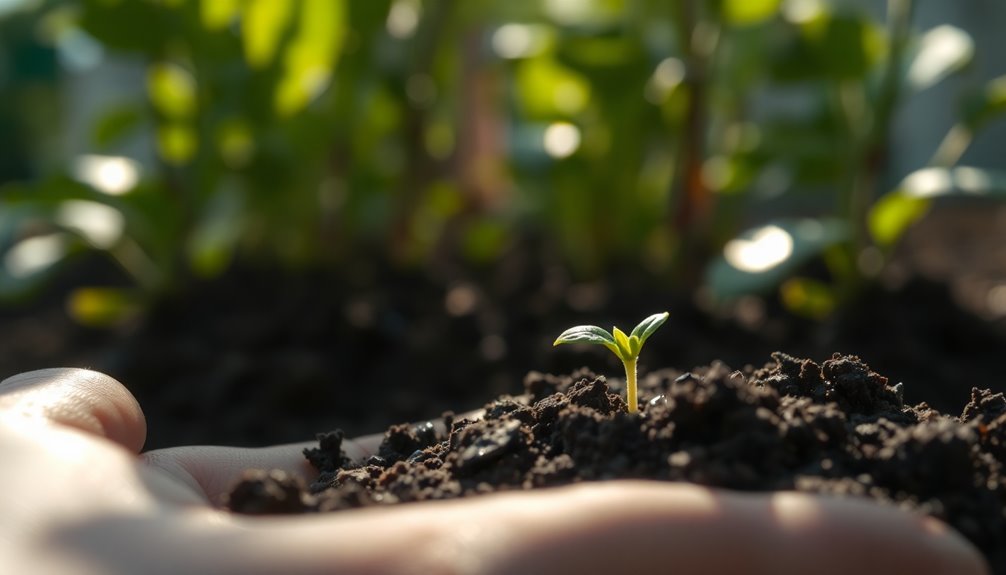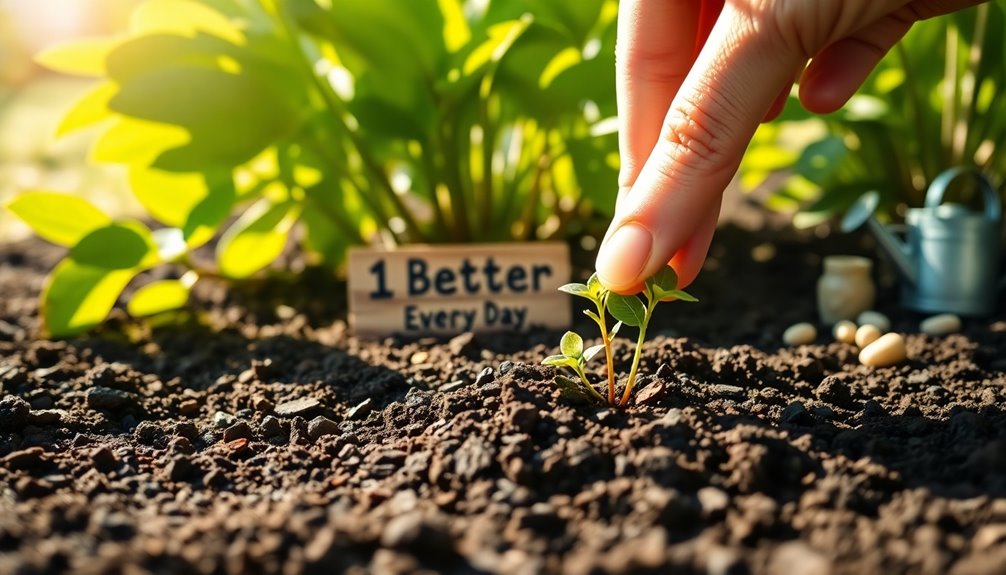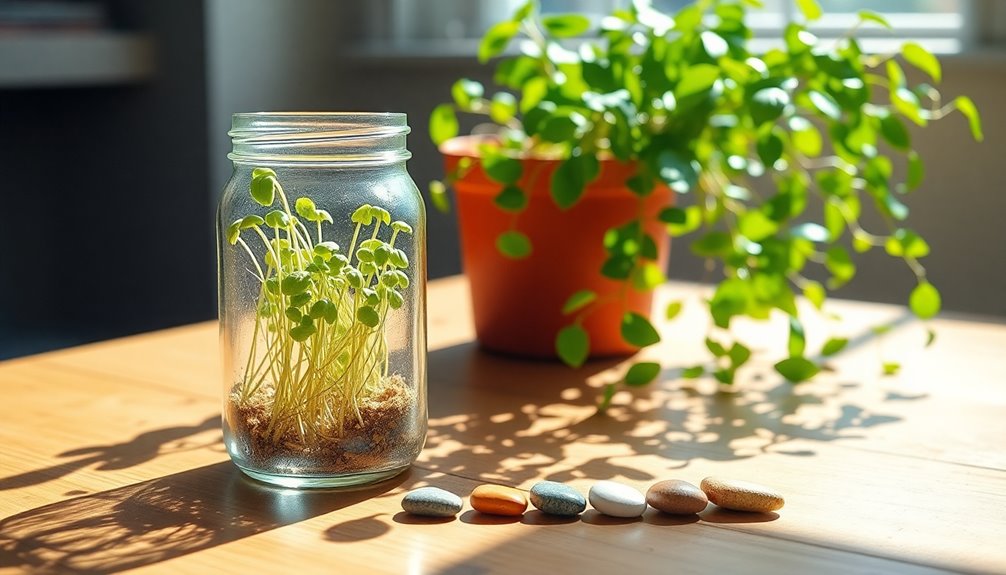To start small and build sustainable habits, focus on one manageable action at a time. Set clear and achievable goals, using the 2-minute rule—if it takes less than two minutes, do it now. Track your daily progress to visualize your routine and celebrate each small win along the way. Creating a supportive environment and connecting with others can keep you accountable. Remember, consistency is key, and habits will evolve with your life. As you implement these strategies, you'll discover even more ways to strengthen your journey toward lasting change.
Key Takeaways
- Start with micro habits to create a foundation for lasting change in your daily routine.
- Track your progress to visualize your habits and maintain motivation over time.
- Set SMART goals to provide clarity and enhance your chances of success.
- Celebrate small victories to stay motivated and inspire those around you.
- Create a supportive environment and utilize accountability to reinforce your commitment to habit formation.
Understand the Power of Small

The beauty of small steps lies in their incredible power to create lasting change. You might think that only grand gestures lead to significant transformations, but that's simply not true. By embracing micro habits, you can gradually shift your daily routine in ways that ultimately lead to big impact.
Imagine starting your day with just five minutes of stretching or drinking a glass of water. These small actions might seem trivial, but over time, they can foster a healthier lifestyle. For example, incorporating natural supplements like NeuroPure can support your journey towards maintaining overall health and wellness.
The key is consistency. When you commit to these small steps, you're not just making temporary changes; you're laying the groundwork for lasting change. Each micro habit reinforces your sense of belonging to a healthier, more fulfilling life. You'll find that as you cultivate these habits, you're not just improving yourself; you're also creating a ripple effect that inspires those around you.
It's essential to celebrate your progress, no matter how small. Each time you take a step forward, acknowledge your efforts. This positivity will encourage you to keep going. Remember, the journey to sustainable habits isn't about perfection; it's about persistence. The more you invest in these small habits, the more confident you'll become in your ability to create change.
Identify Your Current Habits

Recognizing your current habits is an essential step in building sustainable changes. Before you can create new routines, you need to understand what behaviors you already have. This process involves a habit assessment and behavior analysis, allowing you to pinpoint areas for improvement. Here's how to get started:
- Track Your Daily Actions: For a week, jot down your activities, both big and small. This will help you visualize your routine and identify patterns.
- Evaluate Your Emotions: Note how you feel during different habits. Are there behaviors that bring you joy or stress? Understanding these emotions can spark a mindset shift, leading to more intentional choices.
- Identify Triggers: What prompts certain behaviors? Recognizing triggers can help you modify or replace habits that don't serve you well.
Once you complete a thorough routine evaluation, you'll gain insight into your daily life. You might uncover habits you want to keep, while also identifying those that hinder your progress. This isn't about judgment; it's about creating a supportive environment for growth. Remember, everyone has habits they want to change, and you're not alone in this journey. Additionally, understanding natural calorie cycles can inform your decisions on how to adjust your eating habits for better health.
Set Clear, Achievable Goals

Setting clear, achievable goals is essential for turning your aspirations into reality. When you establish specific targets, you're more likely to stay motivated and committed. It's all about creating a roadmap that leads you to your desired destination. To help you with this, consider using the SMART criteria: Specific, Measurable, Achievable, Relevant, and Time-bound.
Here's a quick table to illustrate some examples of effective goal setting:
| Goal Type | Example |
|---|---|
| Fitness | Walk for 30 minutes, 3 times a week |
| Learning | Read one book a month |
| Financial | Save $50 each month |
| Personal Development | Meditate for 5 minutes daily |
| Social | Call a friend once a week |
Additionally, incorporating research-based approaches to your goal-setting can enhance your chances of success, as seen in various studies on diabetes management.
Start With One Habit

Once you've established clear, achievable goals, it's time to focus on one habit at a time. This approach helps you build consistency through daily commitment, making it easier to integrate positive changes into your life. Trying to tackle multiple habits simultaneously can lead to overwhelm, so let's simplify the process.
Here's how to start with one habit effectively:
- Choose Your Habit: Select a habit that aligns with your goals. It could be anything from drinking more water to exercising for 15 minutes daily. Make sure it's specific and manageable.
- Gradual Implementation: Instead of diving headfirst, gradually implement your habit. For example, if you want to read more, start with just five minutes a day. This gradual approach makes the shift smoother and more sustainable.
- Habit Stacking: Pair your new habit with an existing one. For instance, if you already enjoy your morning coffee, stack your new habit of journaling right after. This method leverages your current routines, making it easier to remember and maintain your new habit.
Incorporating mini bands into your fitness routine can also be an effective single habit to start with, as they offer a portable gym experience for workouts anytime, anywhere.
Focusing on one habit allows you to build a solid foundation of consistency. As you master this habit, you'll find it easier to incorporate additional changes over time. Remember, it's about progress, not perfection. Celebrate each small victory, and enjoy the journey of becoming the best version of yourself!
Use the 2-Minute Rule

The 2-Minute Rule is a powerful tool that can transform your approach to building new habits. It's simple: if a task takes two minutes or less to complete, do it right away. This technique not only helps with time management but also sets the stage for consistency building. By breaking tasks down into manageable bites, you make it easier to stay engaged and committed.
Imagine you want to develop a habit of reading more. Instead of setting a goal to read a chapter every day, start by reading just two pages. It sounds easy, right? That's the beauty of the 2-Minute Rule. You're able to fit this small task into your day without feeling overwhelmed. Over time, these tiny actions compound, leading to significant changes in your behavior and mindset.
Using the 2-Minute Rule also encourages you to act immediately rather than procrastinate. When you see tasks as quick and achievable, you're more likely to tackle them. This creates a positive feedback loop, where small successes lead to increased motivation. Plus, you'll find that these little victories foster a sense of belonging in your personal growth journey. Moreover, implementing small changes can be especially beneficial for those looking to overcome alcoholism and its impact on their lives, as it promotes gradual progress towards healthier habits.
Track Your Progress

Tracking your progress is essential for maintaining motivation and ensuring long-term success in building new habits. When you actively monitor your journey, you create a sense of accomplishment that fuels your desire to keep going. Here are a few effective ways to track your progress:
- Daily Journaling: Spend a few minutes each day reflecting on what you accomplished. Write down your successes, challenges, and feelings about your progress. This not only helps you stay accountable but also allows you to see how far you've come over time.
- Set Clear Goals: Break your habits down into manageable, measurable goals. Instead of saying, "I want to exercise more," specify it as "I will walk for 20 minutes, three times a week." When you meet these goals, you'll feel a sense of achievement that motivates you further.
- Find an Accountability Partner: Share your journey with someone who supports you. This could be a friend, family member, or even a colleague. Having someone to check in with can provide encouragement and help you stay committed to your goals. Additionally, consider utilizing a program like Adaptive Body Boost that offers comprehensive support to help you track your progress effectively.
Celebrate Small Wins

Recognizing your achievements, no matter how small, can greatly boost your motivation and drive. Each small win is a stepping stone toward your larger goals. By celebrating these victories, you cultivate gratitude for the progress you're making. Practicing mindfulness during this process is vital, allowing yourself to fully appreciate each moment of success. Incorporating mindfulness meditation into your routine can enhance your ability to savor these moments.
Here's a simple way to visualize your small wins:
| Small Win | How to Celebrate |
|---|---|
| Completing a workout | Reward yourself with a relaxing bath |
| Finishing a book | Discuss your thoughts with a friend |
| Cooking a healthy meal | Share it with loved ones |
When you take the time to celebrate these small wins, you reinforce positive behaviors and create a more enjoyable journey toward your goals. It's not just about the end result; it's about the experience along the way. By practicing gratitude, you shift your focus from what you haven't accomplished to what you have, making each step feel significant.
Build a Support System

Building a support system can make all the difference in building sustainable habits. When you have people cheering you on, you're more likely to stay committed to your goals. Here are three ways to create that supportive network:
- Find Accountability Partners: Connect with someone who shares similar goals. You can check in regularly, share progress, and motivate each other. Knowing someone's counting on you can really keep you on track.
- Join Group Challenges: Participate in challenges that encourage collective growth. Whether it's a fitness challenge or a reading group, these shared experiences can create camaraderie and make the journey more enjoyable. Plus, you'll gain new perspectives and tips from others.
- Leverage Peer Encouragement: Engage with your friends or family and let them know what you're trying to achieve. Invite them to support you, share insights, or even join you in your efforts. This sense of community connection can foster an environment where everyone lifts each other up. Additionally, consider incorporating tools like SlimCrystal bottles to enhance your hydration and support your weight loss journey.
Building a support system isn't just about having cheerleaders; it's about creating a network where everyone feels a sense of belonging. You'll find that when you surround yourself with the right people, your sustainable habits will flourish more naturally.
Adjust and Evolve Your Habits

As you cultivate your support system, it's important to remember that habits aren't set in stone. Embracing habitual flexibility is pivotal to your journey. Life changes, and so should your habits. Allow yourself the space to adjust and evolve as you learn more about what works best for you. This is where the concept of habitual adaptation comes into play; it's all about tweaking your routines to better fit your current circumstances and goals.
To foster a growth mindset, regularly evaluate your habits. Ask yourself questions like, "What's working?" and "What isn't?" This reflection will help you identify areas for continuous improvement. If you find that your morning meditation isn't resonating with you anymore, don't hesitate to switch it up. Maybe try a short walk or a creative journaling session instead. Remember, the goal is to create sustainable practices that genuinely enrich your life. Additionally, adopting a plant-based diet can help you foster healthier habits and enhance your overall well-being.
Involving your support system in this process can also be beneficial. Share your adjustments and solicit feedback; this can deepen your connections and create a sense of belonging. You're not alone in your journey, and others might've valuable insights or experiences to share.
Ultimately, adjusting your habits is a sign of strength and growth. Embrace the changes, and you'll find that each step forward brings you closer to the life you desire. So, stay flexible, keep evolving, and watch as your habits transform alongside you.
Frequently Asked Questions
How Do I Stay Motivated When Progress Feels Slow?
When progress feels slow, discovering inspiration in your goals becomes crucial.
Set small, attainable targets that keep you engaged.
Seek support from friends or communities who share your journey; they can uplift you when motivation dips.
Remember to celebrate victories, no matter how small.
Each advancement matters and strengthens your dedication.
Can I Combine Multiple Small Habits at Once?
Can you really combine multiple small habits at once? Absolutely! Try habit stacking, where you pair a new habit with an existing one. Start with gradual integration; don't overwhelm yourself.
For instance, if you want to drink more water and stretch, do both after brushing your teeth. This approach makes you feel accomplished and connected to your goals.
What if I Miss a Day of My Habit?
Missing a day of your habit happens to everyone, so don't be too hard on yourself. Embrace habit forgiveness and recognize that one slip doesn't define your journey. Focus on habit recovery instead.
Reflect on what caused the missed day, and then get back on track. Remember, it's all about progress, not perfection. You're part of a community working towards growth, and every small step counts in building lasting habits.
How Long Does It Take to Form a New Habit?
Forming a new habit's like planting a seed; it needs daily consistency to grow strong. Typically, you're looking at a habit timeline of about 21 to 66 days, depending on the complexity. Don't get discouraged if it takes longer—everyone's journey is unique.
Focus on showing up each day, even if it's just a little. You'll find that with patience and persistence, those small efforts will blossom into lasting changes you can truly embrace.
Are There Specific Apps for Tracking Habits Effectively?
Yes, there are several great habit tracking apps that can help you stay on track. Apps like Habitica and Streaks allow you to visualize your progress, making it easier to stay motivated.
You can even try habit stacking by linking new habits to existing ones, enhancing your routine. By using these tools, you'll not only track your habits effectively but also feel a sense of achievement as you build a supportive community around your goals.
Conclusion
Just like a tiny seed grows into a mighty tree, your small habits can blossom into lasting change. Nurture them with care, water them with consistency, and watch as they take root in your life. Remember, every great journey starts with a single step. Embrace the process, stay patient, and celebrate each growth along the way. You've got the power to cultivate a healthier, happier you—one small habit at a time. Go ahead, plant that seed!



